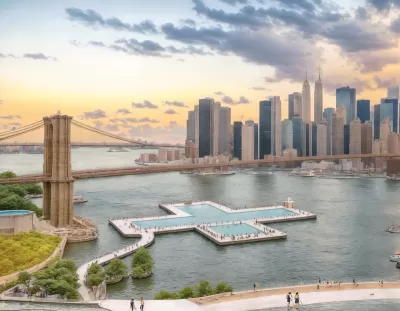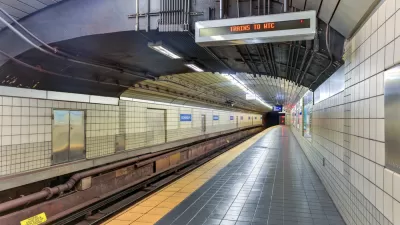The city’s efforts to bring more pools and beaches to its residents could have rippling effects across the state.

A new plan to open up public swimming on the Hudson River will create more public beaches and swimming areas, reports Sarah Amandolare in Fast Company. “With its emphasis on municipal pools and natural waterways in communities that are underserved or vulnerable to extreme heat, the $150 million plan underscores how access to swimming addresses equity, public health, and climate resilience.”
The program starts to reverse decades-old swimming bans that predate the Clean Water Act and the subsequent improvement of water quality in New York City’s rivers. But “Misperceptions of Hudson River water quality will take time to change, experts say. And the new state guidelines still don’t allow communities to respond to water conditions as effectively as possible.”
The city is piloting a $16 million filtered floating pool in the East River, and “the State Department of Health issued guidance for new beaches in January aimed at helping communities throughout the state create their own floating pools in rivers and lakes.” The initiative also includes funding for lifeguard training and expanded access to swim lessons.
According to Amandolare, New York’s efforts are inspiring a global movement to encourage urban swimming. “A swimmable cities charter signed by about 30 international nonprofits, companies, and universities is also being finalized.”
FULL STORY: Why NYC’s floating pool could change beach access for the entire state

Study: Maui’s Plan to Convert Vacation Rentals to Long-Term Housing Could Cause Nearly $1 Billion Economic Loss
The plan would reduce visitor accommodation by 25,% resulting in 1,900 jobs lost.

North Texas Transit Leaders Tout Benefits of TOD for Growing Region
At a summit focused on transit-oriented development, policymakers discussed how North Texas’ expanded light rail system can serve as a tool for economic growth.

Why Should We Subsidize Public Transportation?
Many public transit agencies face financial stress due to rising costs, declining fare revenue, and declining subsidies. Transit advocates must provide a strong business case for increasing public transit funding.

Alabama: Trump Terminates Settlements for Black Communities Harmed By Raw Sewage
Trump deemed the landmark civil rights agreement “illegal DEI and environmental justice policy.”

Dear Tesla Driver: “It’s not You, It’s Him.”
Amidst a booming bumper sticker industry, one writer offers solace to those asking, “Does this car make me look fascist?”

A Visual Celebration of Manhattan’s Chinatown Elder Community, Through Food
Lanterns, cafeteria trays, and community connection take center stage in this stunning photo essay.
Urban Design for Planners 1: Software Tools
This six-course series explores essential urban design concepts using open source software and equips planners with the tools they need to participate fully in the urban design process.
Planning for Universal Design
Learn the tools for implementing Universal Design in planning regulations.
City of Santa Clarita
Ascent Environmental
Institute for Housing and Urban Development Studies (IHS)
City of Grandview
Harvard GSD Executive Education
Toledo-Lucas County Plan Commissions
Salt Lake City
NYU Wagner Graduate School of Public Service




























